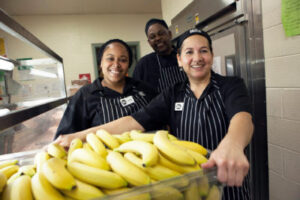If you’ve been following DC Central Kitchen and our Culinary Job Training program for a while, you might already know that since the recession of 2008, we’ve trained 752 adults with histories of incarceration, homelessness, addiction, and chronic unemployment for culinary careers with an 89% job placement rate. You’ve probably also read success stories of graduates like Lou, or Kate, or Billy. That’s a lot to be proud of. But we knew our community needed us to do more in 2016, and here’s how we delivered:
We re-engineered our curriculum
After earning recognition as a Quality Program by the American Culinary Federation in 2015, our chef instructors worked with our local restaurant partners to gather feedback about the most in-demand culinary skills here in DC. In light of the growing demand for fast-casual positions, we launched our ‘CJT Café’ concept, engaging our students in dishing up quick-serve lunches to DCCK volunteers and visitors once a week. We also worked with Bank of America, the Corporation for Enterprise Development (CFED), and the Government Printing Office Federal Credit Union to integrate financial literacy education aimed at helping our students make the most of their new salaries.
We extended our post-graduation support
Thanks to our dedicated Evaluation and Retention Coordinator Jamilah, a 2011 graduate of our training program, we were able to stay in touch with 88% of our graduates for a full year after program completion. Thanks to Jamilah’s coaching and referrals, we found that average wages increased from $11.97 to $12.20 per hour over six months and that full-time employment rates rose by 34% within the first three months after graduation. By extending her services to two years after graduation, we found that a DCCK graduate with a criminal record is 90% less likely to re-offend and return to prison than the national average.
We took a systems approach
We worked hard to engage with the other key stakeholders in our city’s workforce system this year, and we’re lucky to have close and productive partnerships with the District’s Workforce Investment Council (WIC), Department of Human Services, and Department of Employment Services. With the help of partners like the WIC, the University of the District of Columbia Community College, and Goodwill of Greater Washington, we launched a community of practice for our fellow workforce training providers in the spring. Since then, some of our city’s best nonprofits have gathered for productive discussions on understanding Ban the Box legislation, engaging homeless residents receiving Housing First services, and effectively retaining students with barriers to stability. We testified before the Council of DC about workforce issues, leveraged data from our partners at DC Fiscal Policy Institute, and encouraged DC residents to weigh in on our city’s new plan for workforce development.
We shared what we’ve learned
DC Central Kitchen is proudly open source. In April, we hosted a Council on Foundations visit organized by our friends at the Community Foundation of the National Capital Region, welcoming dozens of philanthropists from across the country as they sought to make smarter local investments in job training. We spoke at gatherings like South by Southwest and shared our experiences in one-on-one consultations with groups from Philadelphia to Canada to South Africa. And this month, our results were featured in the Center for Court Excellence’s latest report on the state of DC’s services for men and women coming home from prison. Citing our strong record of helping returning citizens find jobs and specialized support groups within one year of release, the report called our program a “promising practice” and a “recipe for re-entry employment.”
